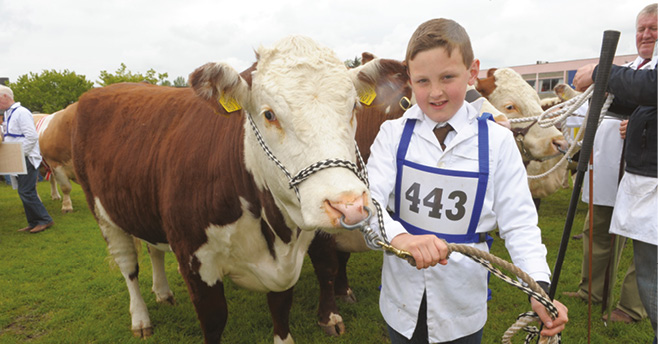The future for farming looks green


agendaNi’s Richard Halleron travelled to Whitehall to discuss the future for farming post-Brexit with Department for Environment, Food and Rural Affairs (DEFRA) Secretary Michael Gove.
Plans to consult on a new, independent body that would hold government to account for upholding environmental standards in England after the UK leaves the European Union have been set out by Environment Secretary Michael Gove.
“Leaving the EU gives us the opportunity to put the environment at the heart of policy making, while ensuring vital protections for our landscapes, wildlife and natural assets are not only maintained but enhanced,” he says.
To help deliver a Green Brexit, UK ministers will consult on a new independent, statutory body to advise and challenge government and potentially other public bodies on environmental legislation. When required, the new body will step in to hold these bodies to account and enforce standards.
A consultation on the specific powers and scope of the new body will be launched early in 2018. Gove adds: “We will deliver a Green Brexit, where environmental standards are not only maintained but enhanced.
“We are setting out our plans to ensure the powerful are held to account. Our aim is to consult on creating an independent body, one which will encourage transparency and prevent careless or irresponsible behaviour that damages our natural environment.”
Gove says he will consult as widely as possible on these proposals to ensure that these important decisions are right for future generations.
Currently, environmental decisions made in the UK – from improving air and water quality to protecting endangered species – are overseen by the European Commission, which monitors targets, scrutinises new legislation and takes action against illegal behaviour.
The current system is underpinned by a number of environmental statutes, such as sustainable development and the polluter pays principle. All of this puts the onus on polluting individuals or businesses to pay to repair damage.
Although these principles are already central to government environmental policy, they are not set out in one place besides the EU treaties. The proposed consultation on the new statutory body will, therefore, explore the scope and content of a new policy statement to ensure environmental principles underpin policy making.
“One of the key questions, which we will explore with the devolved administrations, is whether Scotland, Wales and Northern Ireland wish to take a different or similar approach,” says Gove.
“We want to hear from as many people and organisations as possible right across the UK, from business, non-governmental organisations, the farming sector, civil society, and elsewhere.”
Speaking at the 2017 Conservative Party Conference Gove said that the UK is going to make a success of life outside the European Union, “and nowhere are the possibilities for progress greater than with the environment”.
He says: “We now have a once in a lifetime opportunity. For the first time in more than 40 years we can now determine our own environmental policies. We can do what we think is best to make our country cleaner, greener and more beautiful.”
Gove totally buys-in to the principle of the UK helping to deliver an international response to the challenge of environmental sustainability.
“Global warming threatens the balance of life on earth. Plastics in our oceans, waste in our rivers and nitrogen oxide in our air endanger our fellow animals and harm our children’s health.

“Precious habitats, from ancient woodlands in our own country to the great green lungs of our tropical rainforests, are being lost and with them a home for threatened wildlife. Leaving the European Union gives us the chance to secure a special prize, that of a Green Brexit.”
Gove outlines that the current Common Agricultural Policy (CAP) has channelled very large sums of taxpayers’ money to the already wealthy, simply because of the amount of land they have.
“That is plain wrong,” he states. “What makes it worse is that the CAP hasn’t provided the right support to our farmers in their drive to improve animal welfare standards and enhance the environment.
“The UK is home to the best farmers in the world, producing the best food in the world. But inside the EU they are held back by bureaucracy, hampered in their efforts to get into new markets, and hindered in their ambitions to further improve our environment. Our rural communities need a new deal. Outside the EU we can do so much better.
“Outside of the CAP, we can stop subsidising the rich on the basis of how much land they own and instead spend money on enhancing the environment, supporting innovation, improving productivity, training a new generation of entrepreneurial young farmers and reviving rural communities.”
The current government has pledged that when the UK leaves the EU it will match the £3 billion that farmers currently receive in support from the CAP until 2022.
“I want to ensure that we go on generously supporting farmers for many more years to come. But that support can only be argued for against other competing public goods if the environmental benefits of that spending are clear.
“Of course there are many other, very good, reasons why we should provide support for agriculture. The first is simple and straightforward. Farmers produce the high quality food which the rest of us enjoy so much. Without them, our lives would be poorer and our stomachs emptier.
“We are uniquely fortunate that British food enjoys a reputation for quality which has been built on high animal welfare standards, strong environmental protections and the dedication of farmers and growers to meeting ever more demanding consumer expectations.
“Our food culture in Britain has become much more diverse and discriminating in my lifetime, influenced by chefs and bloggers, campaigners and entrepreneurs.
“Also, the biggest driver of higher standards and wider choice in food and drink has been the innovation and creativity of farmers and growers themselves. It is my job to support them to grow, produce and sell more.”
But Gove is not promising an open cheque book for agriculture moving forward. Indeed, he wants to see radical reform of the way support is made available to the farming sectors.
“From all the conversations I have had so far with farmers, land owners and managers I know that there is a growing appetite for a new system of agricultural support which respects their work and puts environmental protection and enhancement first.
“That means support for woodland creation and tree planting as we seek to meet our aim of 11 million more trees. Because trees are not only a source of beauty and wonder, living evidence of our investment for future generations, they are also a carbon sink, a way to manage flood risk and a habitat for precious species.
“We should also support those land owners and managers who cultivate and protect the range of habitats which will encourage biodiversity.”





